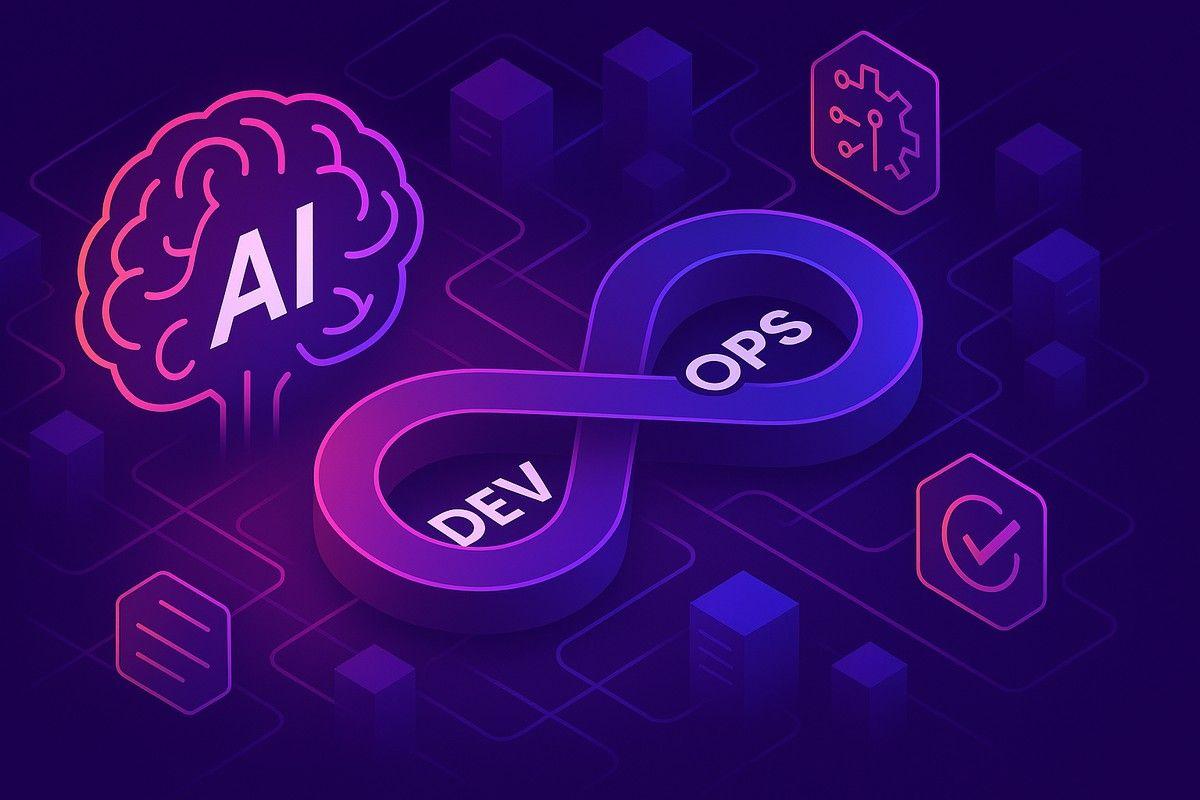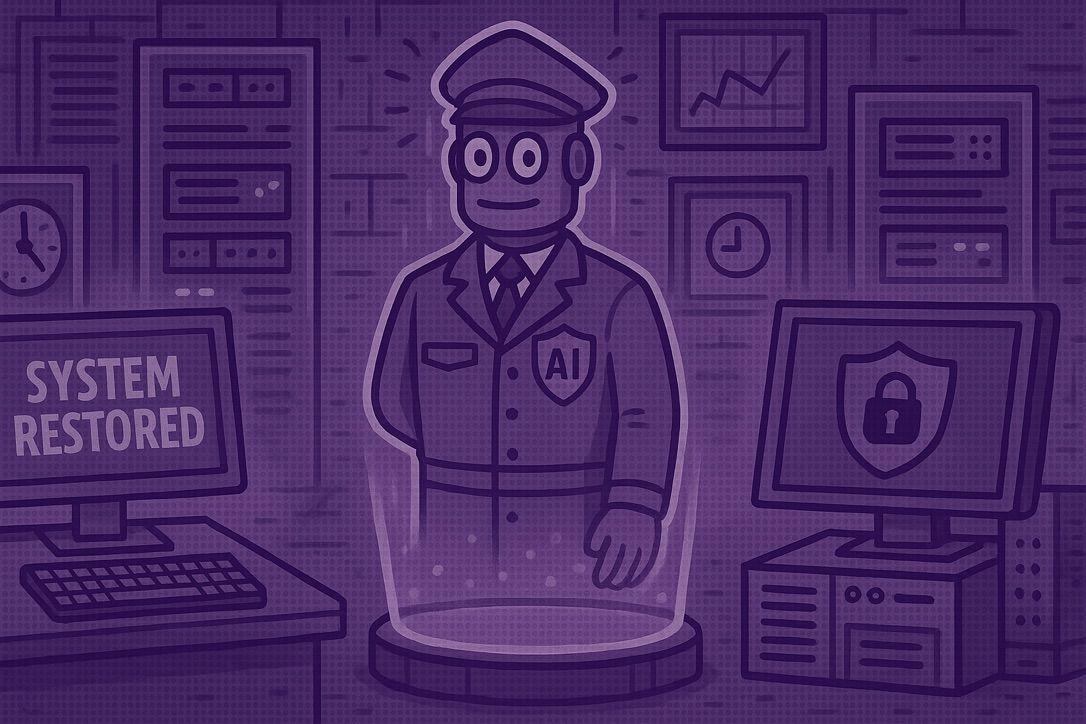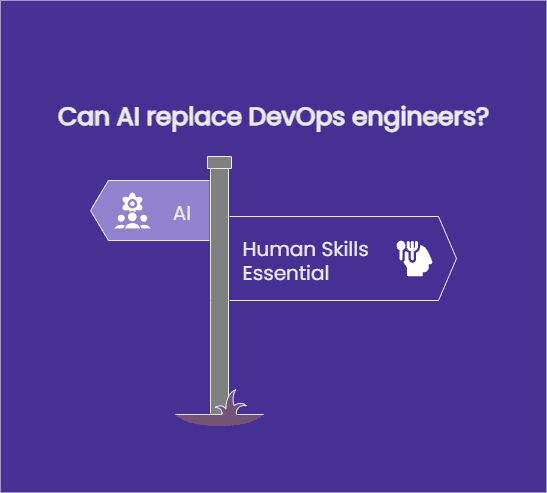- ai
- aiops
- devops
AIOps in DevOps: Transforming IT Operations through Artificial Intelligence
Apr 30, 2025
-
Damian Szewczyk
-
9 minutes

AIOps revolutionizes DevOps practices by integrating artificial intelligence into IT operations, enabling proactive issue resolution and enhanced system reliability. This technology automates critical processes, analyzes vast datasets, and delivers predictive insights that traditional operational approaches cannot match.
AIOps (Artificial Intelligence for IT Operations) integrates AI and machine learning directly into IT operations to automate processes, enhance efficiency, and reduce downtime. Gartner coined this term to describe the combination of big data analytics with AI for managing complex IT environments.
DevOps focuses on streamlining software development and deployment while AIOps enhances operational capabilities through predictive analytics and automated responses. AIOps doesn't replace DevOps but instead complements its practices by adding intelligence to operational workflows.
Machine learning powers AIOps systems to analyze vast datasets, detect anomalies proactively, and recommend precise solutions. This intelligence accelerates incident resolution and makes IT operations more resilient against unpredicted failures.
AIOps analyzes data from multiple sources including logs, metrics, and events to identify patterns and predict potential system failures. Advanced algorithms detect subtle anomalies in system behavior before they escalate into critical issues.
Big data technologies form the foundation of effective AIOps implementations. These platforms aggregate information from diverse sources and establish comprehensive monitoring frameworks that provide complete visibility into system health.
The anomaly detection capabilities distinguish normal variations from actual problems. For example, AIOps identifies unusual server behavior, isolates affected components, and initiates corrective actions without human intervention. This proactive approach minimizes downtime and maintains service reliability even during unexpected events.
DevOps and AIOps serve complementary but distinct purposes in modern IT environments. DevOps connects development and operations teams through collaborative workflows, continuous integration, and delivery automation. It focuses primarily on process optimization and deployment efficiency.
AIOps applies machine learning and artificial intelligence to operational data. Its primary goals include real-time monitoring, anomaly detection, and proactive issue resolution before users experience problems. While DevOps automates application deployment, AIOps ensures the supporting infrastructure remains stable through predictive analytics.
AIOps enhances DevOps workflows by providing deeper operational insights. For instance, AIOps tools analyze CI/CD pipeline metrics to detect anomalies in build performance or identify deployment failures based on historical patterns. This DevOps integration< creates more resilient systems that maintain reliability even during rapid development cycles.
AIOps delivers several key advantages when integrated into DevOps practices:
Improves visibility across systems by consolidating operational data into unified dashboards. Teams gain holistic perspectives that enhance collaboration and accelerate decision-making processes.
Accelerates incident response through AI-driven anomaly detection. AIOps identifies issues in real-time and automates initial responses, significantly reducing mean time to resolution (MTTR).
Enhances data quality by cleaning and normalizing information from disparate sources. This ensures accurate performance monitoring and delivers actionable intelligence.
These benefits enable organizations to optimize IT operations, reduce manual workloads, and maintain high service reliability in increasingly complex environments. Teams spend less time firefighting and more time delivering business value through innovation.
AIOps platforms leverage artificial intelligence to streamline operations through automated monitoring, anomaly detection, and predictive maintenance. These tools integrate seamlessly with existing DevOps workflows to enhance operational efficiency without disrupting established processes.
Modern AIOps solutions combine big data analytics with machine learning capabilities to address complex IT challenges. CloudFabrix excels at root cause analysis and noise reduction in system logs, while Vector delivers AI-driven monitoring optimized for SaaS, Fintech, and eCommerce environments.
Dynatrace: Performs automatic root cause analysis using causation-based AI algorithms that trace problems to their source.
Datadog: Monitors infrastructure comprehensively with anomaly detection across multi-cloud environments.
AppDynamics: Delivers real-time application performance insights with predictive issue resolution capabilities.
Moogsoft: Executes proactive incident management through AI-based event correlation and automated remediation workflows.
Monitoring tools like Splunk incorporate AI to deliver comprehensive observability by unifying infrastructure metrics, logs, and traces into cohesive dashboards. These systems automate routine diagnostics while providing predictive analytics that prevent incidents before they impact users.
AIOps transforms theoretical concepts into practical applications that demonstrably improve efficiency, reliability, and scalability across IT operations.
AIOps tools analyze application metrics to identify performance bottlenecks in real time. These systems optimize resource allocation during peak usage periods, preventing slowdowns and maintaining consistent user experiences. Organizations using AIOps for performance monitoring report up to 30% improvements in application response times.
AIOps continuously analyzes CI/CD pipeline metrics and system logs to detect anomalies such as failed builds or deployment errors. This proactive approach identifies issues before they affect production systems, minimizing disruptions in development workflows and maintaining deployment velocity.
AIOps supports digital transformation initiatives by automating complex processes across hybrid IT environments. It enables organizations to scale operations seamlessly while maintaining system integrity through intelligent automation and predictive maintenance. Companies implementing AIOps achieve higher success rates for digital transformation projects by reducing operational friction.
The evolution of AIOps technology directly impacts how organizations implement and benefit from DevOps practices. Several key developments are reshaping this landscape:
AIOps platforms continue to integrate sophisticated features like edge-based deep neural networks. By 2025, over 55% of such analysis will occur at network edges, enabling real-time insights and faster decision-making at the point of data generation. These advancements improve data correlation across distributed IT environments and foster more effective cross-team collaboration.
NLP technology transforms how teams interact with operational data and systems. Modern AIOps platforms utilize natural language processing to interpret unstructured log data and respond to conversational queries. This capability makes complex operational data accessible to broader team members without specialized technical knowledge.
AI and machine learning continue to refine anomaly detection, predictive analytics, and automated remediation processes. These technologies reduce manual intervention requirements while ensuring systems remain resilient in dynamic environments. The most effective implementations address challenges like computational resource optimization and reliability verification to ensure sustainable adoption.
AIOps represents a transformative approach to IT operations that enhances DevOps practices through intelligent automation, real-time insights, and predictive capabilities. Organizations implementing AIOps achieve greater operational efficiency, improved system reliability, and more effective cross-team collaboration. As artificial intelligence continues to evolve, its integration with DevOps workflows will enable teams to manage increasingly complex systems with greater precision and agility.

Did you know you can reduce business downtime with AI? See how tools from smart monitoring to predictive maintenance keep your business online.

Discover the 5 levels of DevOps maturity and learn how to progress through the 5 phases of DevOps: continuous integration, deployment, and monitoring.

How AI is transforming DevOps by enhancing software development processes and streamlining operations. Can artificial intelligence truly replace DevOps engineers?